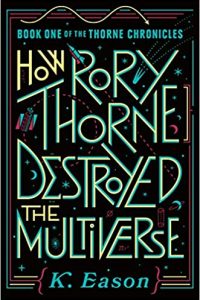Ian Mond Reviews All These Worlds: Reviews & Essays by Niall Harrison
 All These Worlds: Reviews & Essays, Niall Harrison (Briardene Books 978-1-87082-467-5, £20.00, 480pp, tp) April 2023.
All These Worlds: Reviews & Essays, Niall Harrison (Briardene Books 978-1-87082-467-5, £20.00, 480pp, tp) April 2023.
It’s a lovely coincidence that I’m reviewing works by Matthew Cheney and Niall Harrison in the same column. They have significantly influenced me as a reader and now as a reviewer. Harrison, along with Cheney, Abigail Nussbaum, Martin ‘‘Lewis’’ Petto, and Jonathan Mccalmont, were the writers I initially gravitated towards when I started taking an interest in genre criticism. And while I loved them all, the one I had the most affinity with was Harrison. The way he approached science fiction and fantasy, with passion and generosity, opened my eyes to what the genre was truly capable of (and still is). I was reminded of all this as I read All These Worlds: Reviews & Essays, a rich retrospective of Harrison’s criticism over a ten-year period from 2005 to 2015.
Harrison’s lively introduction, with its eye-catching opening line – ‘‘Once upon a time in the West there was a genre’’ – places the reviews we are about to read into their historical context. He speaks eloquently about how September 11 ruptured a field already questioning its purpose; and the bevy of ideologies and movements – mundane science fiction, the New Weird, the New Space Opera – that attempted to redefine the promises made by Golden Age SF; and how RaceFail in 2009 saw the field reckon with a past of cultural appropriation and minimising marginal voices. Harrison concludes with his hopes for a future that sees more work in translation, that better recognises ‘‘work that addresses planetary concerns,’’ such as climate change, and most importantly, for all of us ‘‘to listen more, risk more, continue to read and recognise more widely.’’
In the introduction Harrison informs us that the book has been shaped to ‘‘provide sketches of what I perceive to be important discussions from the years covered.’’ He certainly achieves that outcome. Each review, published in venues such as Strange Horizons, Vectors, and Interzone, progressively paint a picture of a genre in a state of flux, struggling to come to terms with its identity. And as Harrison works through each emerging trend with a healthy dose of scepticism (his take on Interzone 216, edited by Geoff Ryman and devoted to mundane science fiction, is a prime example), he never loses sight of the transformational power of science fiction, its ability to change how we view our world. That attitude is evident in Harrison’s extraordinary piece on Arcadia by Lauren Groff. It is as much a meditation on where the genre is headed as it is a beautiful, thoughtful exploration of the novel. We see something similar in his ardent reviews of Magic for Beginners by Kelly Link (‘‘You already know that you need to read this collection’’) and Elysium by Jennifer Marie Brissett (‘‘Page by page Elysium merely dazzles; and then it absorbs; and then, at the end, as it must, it burns’’).
What has always drawn me to Harrison’s work is the welcome mat he puts out to the reader, each review an opportunity to engage, to start a conversation. Typically Harrison’s reviews feature a cracking opening sentence (my favourite: ‘‘Let’s talk about sex, because there’s nothing like a bit of sex to get the judgemental juices flowing’’) while his plot summaries (by far the hardest thing to write as a reviewer) are expressed with an energy and verve that, in some cases, makes the work in question sound more interesting than it actually is. He can be harsh, but he’s never rude or condescending, and while his sentences are elegant, his word choices precise, and his phrasing on point (I might steal ‘‘After some narrative throat cleaning’’), the reviews are never about fluffing up his ego or showing off his breadth of knowledge, they are always about the work and what it says or fails to say about the genre we all love.
The three essays that conclude the collection all do something that Harrison is excellent at, provide a birds-eye view of an aspect of the field: whether it be the history of the genre or the state of Chinese Science Fiction. The one that resonated with me the most was the consolidation of his annual summary of the Clarke Award nominees from 2009 to 2013. They not only gave me a nostalgic buzz (such as Chris Priest’s ‘‘broadside’’ of the 2012 nominees), but they also provide a historical record of an inflection point, a transition from an award dominated chiefly by white men to one that was more diverse, open to different voices and perspectives.
Because All These Worlds: Reviews & Essays is a retrospective, I can’t help but speak about Niall Harrison in the past tense. But the fact is, after 2015, his reviews mostly vanished, with only the odd essay or Twitter post to remind us of what we were all missing. Thankfully, Harrison is back, publishing a regular column on Strange Horizons, where he continues a journey he started decades ago, chronicling, scrutinising, and embracing a genre that continues to evolve.
Ian Mond loves to talk about books. For eight years he co-hosted a book podcast, The Writer and the Critic, with Kirstyn McDermott. Recently he has revived his blog, The Hysterical Hamster, and is again posting mostly vulgar reviews on an eclectic range of literary and genre novels. You can also follow Ian on Twitter (@Mondyboy) or contact him at mondyboy74@gmail.com.
This review and more like it in the June 2023 issue of Locus.
 While you are here, please take a moment to support Locus with a one-time or recurring donation. We rely on reader donations to keep the magazine and site going, and would like to keep the site paywall free, but WE NEED YOUR FINANCIAL SUPPORT to continue quality coverage of the science fiction and fantasy field.
While you are here, please take a moment to support Locus with a one-time or recurring donation. We rely on reader donations to keep the magazine and site going, and would like to keep the site paywall free, but WE NEED YOUR FINANCIAL SUPPORT to continue quality coverage of the science fiction and fantasy field.
©Locus Magazine. Copyrighted material may not be republished without permission of LSFF.







